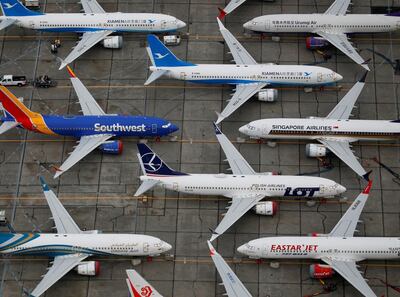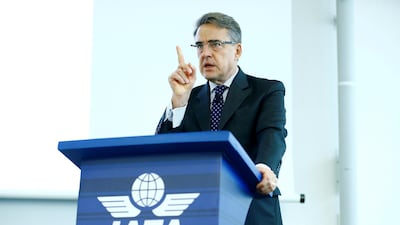Greater government intervention in airlines amid the pandemic will limit consolidation within the industry in the next three to five years.
Foreign ownership rules and a liquidity crunch will also slow down consolidation in the industry, Alexandre de Juniac, outgoing director general of the International Air Transport Association, told The National.
“I do not believe consolidation will be very active in the coming three to five years because you still have foreign ownership limitations everywhere and because the intervention of states has increased, potentially through shareholding," he said.
“I do not see them giving up their shares in a company in which they have invested taxpayer money to sell to a neighbouring country or partner.”
Consolidation will also be an expensive proposition for cash-strapped airlines, said Mr de Juniac.
“I do not think airlines have the money to commit to any consolidation in the next three to five years ... they don’t have a penny to do that.”
Governments have poured in aid worth $225 billion to prop up airlines ravaged by the Covid-19 crisis that has shut borders, hit revenue and grounded aircraft.
Iata has called on governments to support a restart in international travel through stimulus measures such as subsidies for air tickets, routes and domestic journeys.
The aviation industry will have fewer players operating smaller networks in the next three to five years, with the possibility of further bankruptcies given that many small and medium-sized airlines remain fragile, Mr de Juniac said.
A shrinking industry “is not good news” for the market and it is “not good news for passengers”, he said.
“It means less destinations, less connectivity and – perhaps, in some cases – higher fares and reduced competition.”
The structure of the industry will remain unchanged, centred around budget and full-service airlines that will overcome Covid-induced challenges – mainly due to government support.
“Long-haul, low-cost is still a question mark,” he said. “It is in a very, very difficult situation. I do not know if and when it will restart.”
Mr de Juniac said the industry had probably reach the bottom of the crisis.
“I hope there will be no fourth or fifth wave with a different mutation of the virus that will resist the vaccine,” he said.
Mr de Juniac expects a recovery that is linked to vaccination drives and efforts to contain the spread of the virus.
“The recovery will accelerate during the second half of 2021 and in 2022,” he said.
The resumption of travel could be “very fast and very strong”, so governments and the industry must be prepared, he said.
The pandemic has had three main lessons, with the first being that airlines need to strengthen their balance sheets as the industry is “too fragile”. They also need to be better prepared with processes and equipment and, thirdly, to continue to advocate international collaboration between countries, as well as between governments and the aviation industry, said Mr de Juniac.
“We cannot deal with a world problem like this as we have done – completely fragmented, no collaboration,” he said. “Frankly, it is unacceptable.”
The executive called on governments to form a strategy to reopen economies and borders while they vaccinate and conduct tests to curb the spread of the pandemic.
“This gives people more reason to follow tough measures that are necessary in the short-term, with a view of an end in sight,” he said.
The major challenge for the industry is to ensure that travel is safe through the adoption of reliable and simple processes that are homogenous and based on user-friendly technology.
The organisation has touted the Iata Travel Pass, a digital health passport, as a potential solution.
To build back greener, the 290-member body is considering “more ambitious” climate change targets and is working on a plan, Mr de Juniac said.
“We think that we should do more. We will probably, in the coming months, set up more ambitious targets. The industry is ready for that. We are convinced we have to do it,” he said.

“Even in this crisis we are still thinking long term to comply with our responsibility for the planet,” he said.
The industry contributes 2 per cent of global carbon emissions and pledged to reduce net emissions to half of 2005 levels by 2050.
Mr de Juniac said biofuel would be a key contributor to carbon reduction in the next 20 years because “it is safe and it works”.
There is need for a commitment from the industry to use sustainable aviation fuel, in addition to significant government investment to scale up its production and distribution networks.
“It is really surprising to see that governments have invested billions and billions on renewable energy everywhere and they are not putting a penny into sustainable aviation fuels,” he said.
Meanwhile, Iata continues to maintain and push for its gender balance programme called 25 by 2025.
The Iata boss will hand over the reins to IAG veteran Willie Walsh in April, after more than four years at the helm.
The start of Mr de Juniac’s tenure at the lobby group was marked by a decade of airline profitability.
However, he faced mounting challenges that rocked the industry – from two Boeing 737 Max crashes to Britain’s complicated exit from the EU, the long-term crisis of climate change and Covid-19.
Mr de Juniac, whose motto was aviation is “the business of freedom”, said this has never been more true than now.
“This crisis has shown that perfectly, more than I could have ever known, unfortunately,” he said.


